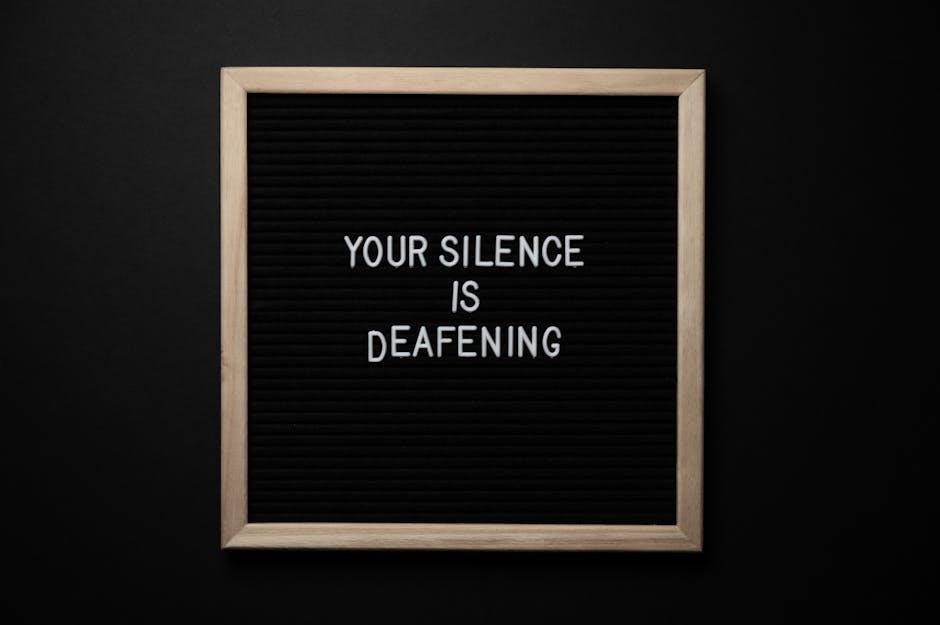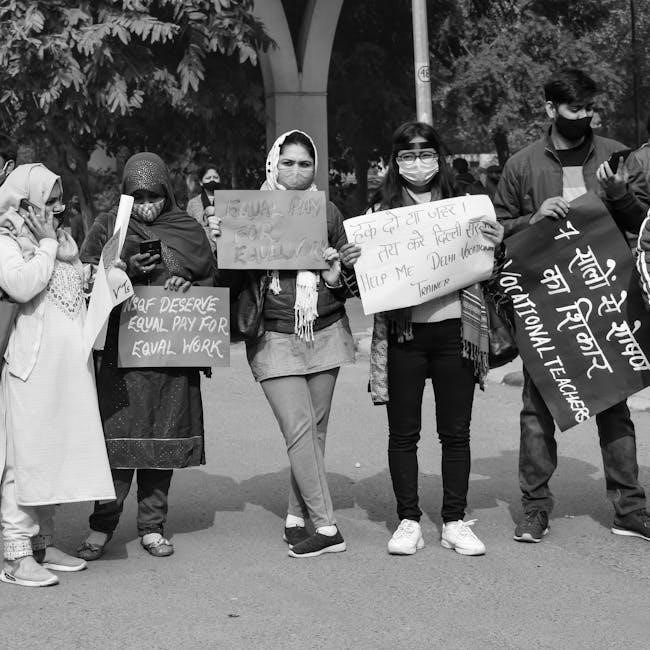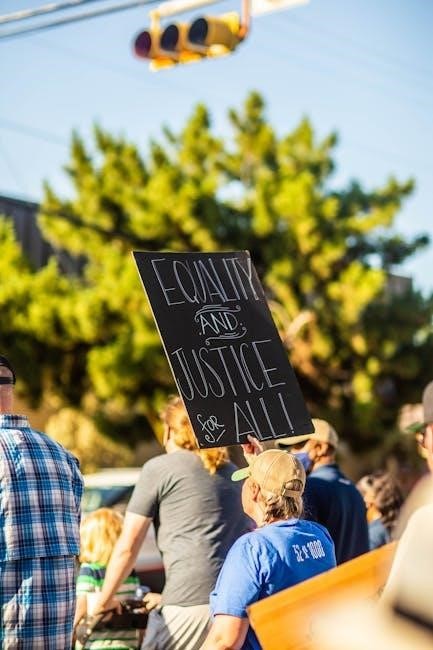social justice fallacies pdf
Social justice fallacies involve flawed arguments that hinder progress toward equality. Recognizing these errors is crucial for fostering fair discourse and addressing systemic issues effectively and promoting meaningful change.
Definition and Overview
Social justice fallacies refer to flawed reasoning patterns that emerge in discussions about equality, fairness, and systemic issues. These fallacies often masquerade as valid arguments but fail to hold up under scrutiny. They arise when emotions, biases, or oversimplified thinking replace logical analysis. For instance, arguments may rely on straw men, false dichotomies, or appeals to emotion rather than evidence. Fallacies in social justice contexts can obstruct meaningful progress by diverting attention from nuanced solutions. Understanding these errors is essential for promoting equitable and rational discourse. By identifying and addressing them, individuals can engage more effectively in conversations about inequality and justice. Critical thinking plays a vital role in unraveling these fallacies and fostering constructive dialogue.
The Importance of Studying Fallacies in Social Justice
Studying fallacies in social justice is crucial for fostering rational and equitable discourse. Fallacies often undermine constructive conversations, leading to miscommunication and polarization. By understanding these errors, individuals can identify flawed reasoning in arguments, such as straw man fallacies or false dichotomies. This awareness enables advocates to address issues more effectively and promote genuine understanding. Fallacies frequently obscure the nuances of social justice debates, making it harder to find solutions. Critical thinking and logical analysis are essential tools for navigating these challenges. Educating oneself about fallacies empowers individuals to engage in more meaningful and productive discussions. Ultimately, recognizing and challenging fallacious reasoning helps advance social justice by ensuring arguments are grounded in evidence and logic rather than emotional appeals or oversimplifications.

Common Social Justice Fallacies
Social justice debates often suffer from fallacies like straw man arguments, false dichotomies, and emotional appeals. These errors distort discussions, hindering progress and fostering division rather than understanding.
The Straw Man Fallacy in Social Justice Arguments
The straw man fallacy occurs when an argument is misrepresented to be easily refuted, often in social justice debates. This fallacy involves exaggerating or simplifying opponents’ views to make them appear weaker or more extreme than they actually are. For example, dismissing calls for systemic reform by labeling all advocates as “radicals” distorts the conversation. This tactic undermines constructive dialogue and fosters polarization. It also shifts focus away from the core issues, hindering meaningful progress. Recognizing and addressing straw man arguments is essential for maintaining integrity and promoting understanding in social justice discussions. By engaging with the actual arguments rather than caricatures, advocates can foster more productive and respectful exchanges.
The False Dichotomy in Social Justice Debates

The false dichotomy fallacy presents two opposing options as the only possibilities, ignoring other viable perspectives. In social justice debates, this fallacy often oversimplifies complex issues, forcing individuals to choose between extremes. For example, framing discussions on inequality as “either complete equality or systemic oppression” excludes nuanced solutions. This fallacy polarizes conversations, making constructive dialogue difficult. It also dismisses the complexity of social issues, reducing them to binary choices. By limiting the scope of debate, the false dichotomy hinders progress and fosters division. Recognizing this fallacy is crucial for promoting inclusive and balanced discussions. Addressing it requires acknowledging the range of viewpoints and seeking solutions that account for the diversity of human experiences and contexts.
The Appeal to Emotion Fallacy in Social Justice Discourse
The appeal to emotion fallacy occurs when arguments rely on evoking feelings rather than presenting logical evidence. In social justice debates, this fallacy often surfaces through vivid storytelling or emotional language to sway opinions. While emotions can highlight injustices, they can also obscure factual analysis and lead to hasty conclusions. For instance, a heartfelt anecdote about inequality might garner support without addressing systemic complexities. This fallacy undermines critical thinking by prioritizing empathy over evidence. It can polarize discussions, making it harder to find balanced solutions. Recognizing this fallacy is essential for maintaining objective discourse. Encouraging evidence-based discussions helps ensure that social justice efforts are both compassionate and effective, avoiding decisions driven solely by emotional appeal.
The Role of Logic and Critical Thinking
Logic and critical thinking are essential for identifying fallacies, ensuring arguments are evidence-based, and fostering rational discourse in social justice discussions.

Understanding Logical Fallacies in Social Justice Contexts
Logical fallacies often undermine social justice discussions by presenting weak arguments as valid. Common fallacies include the straw man, where opponents are misrepresented, and false dichotomies, which oversimplify complex issues. These errors obscure nuanced reasoning and hinder progress. Recognizing such fallacies requires critical thinking and a commitment to evidence-based dialogue. By understanding these pitfalls, advocates can strengthen their arguments and promote more equitable outcomes. Logical fallacies not only distort reality but also alienate potential allies, making it harder to address systemic inequities. Thus, identifying and addressing these errors is essential for fostering meaningful change and ensuring that social justice efforts remain grounded in reason and evidence.
The Impact of Cognitive Biases on Social Justice Reasoning

Cognitive biases significantly influence social justice reasoning by skewing perceptions and judgments. These biases, such as confirmation bias and availability bias, lead individuals to favor information that aligns with their preexisting beliefs or overemphasize vivid anecdotes over statistical evidence. Such biases often result in oversimplified or misguided conclusions, undermining the complexity of social justice issues. For instance, the halo effect may cause people to uncritically accept arguments from charismatic figures, while the anchoring bias can lead to disproportionate focus on isolated incidents. These psychological distortions not only hinder objective analysis but also perpetuate polarization and misinformation. Recognizing and addressing these biases is crucial for fostering more rational and equitable social justice discourse. By acknowledging their influence, advocates can strive for more balanced and evidence-based reasoning in addressing systemic inequities.

Addressing Fallacies in Social Justice Discussions
Addressing fallacies in social justice discussions requires strategies to identify and counter flawed arguments. Education plays a key role in promoting critical thinking and fostering constructive dialogue.
Strategies for Identifying and Countering Fallacious Arguments
To effectively address fallacies in social justice discussions, it is essential to employ strategic approaches. First, fostering critical thinking through education helps individuals recognize logical errors. Encouraging open dialogue and questioning assumptions can uncover flawed reasoning. Additionally, promoting evidence-based arguments ensures that discussions are grounded in facts rather than emotions or biases. Another key strategy is to address cognitive biases, which often underpin fallacious arguments. By applying structured analysis and logical frameworks, individuals can systematically identify and challenge fallacies. Furthermore, encouraging empathy and understanding in discussions can reduce polarization and create space for constructive debate. Finally, ongoing education and exposure to diverse perspectives help build resilience against falling into or being swayed by fallacious reasoning. These strategies collectively promote more informed and equitable social justice discourse.
The Role of Education in Promoting Critical Thinking
Education plays a pivotal role in fostering critical thinking, essential for identifying and countering fallacious arguments in social justice contexts. By incorporating logical reasoning and argumentation skills into curricula, educational institutions empower individuals to evaluate evidence objectively. Teaching students to recognize cognitive biases and common fallacies, such as straw man arguments or false dichotomies, enhances their ability to engage in nuanced discussions. Furthermore, encouraging interdisciplinary learning connects social justice issues with broader analytical frameworks. Educators who model open-mindedness and encourage questioning promote a culture of intellectual humility and collaborative problem-solving. Ultimately, education equips individuals with the tools to dissect complex social issues critically, fostering a society better equipped to address inequality and injustice effectively. This foundational skill set is vital for advancing meaningful and informed social justice advocacy.

Recognizing and addressing social justice fallacies is essential for fostering equality and meaningful discourse. Critical thinking and education are vital tools in promoting awareness and combating flawed arguments effectively.
The Necessity of Critical Engagement in Social Justice
Critical engagement is vital for advancing social justice, as it enables individuals to identify and challenge flawed arguments. By fostering nuanced dialogue, it promotes understanding and reduces polarization. Logical fallacies, such as straw man or false dichotomy, often hinder progress, emphasizing the need for careful analysis. Education and awareness are key to equipping individuals with the tools to engage effectively. Encouraging open-mindedness and evidence-based reasoning helps combat misinformation and fosters empathy. Critical engagement ensures that social justice efforts remain grounded in reality, avoiding superficial or divisive debates. Ultimately, it empowers individuals to contribute meaningfully to creating a more equitable society.

Final Thoughts on Avoiding Fallacies in Social Justice Advocacy
Avoiding fallacies in social justice advocacy is essential for maintaining credibility and fostering meaningful change. Fallacies like straw man, false dichotomy, and appeal to emotion can undermine even the most well-intentioned arguments. To combat this, advocates must prioritize critical thinking and logical reasoning. Education plays a pivotal role in equipping individuals with the skills to identify and counter fallacious arguments. Encouraging open dialogue and evidence-based discussions can help mitigate the impact of cognitive biases. By promoting a culture of intellectual humility and empathy, advocates can engage in more productive conversations. Ultimately, avoiding fallacies ensures that social justice efforts remain focused on tangible solutions rather than divisive rhetoric, leading to a more inclusive and equitable society.
